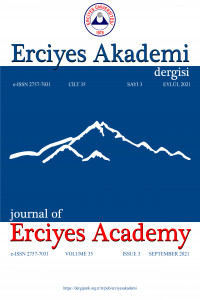Öz
Anahtar Kelimeler
Heterotopya Mekânın Poetikası Viktor Pelevin Omon Ra Michel Foucault
Teşekkür
Bu makale, birinci yazarın ikinci yazarın danışmanlığında hazırlamış olduğu tezden üretilmiştir. Bilgilerinize arz ederim.
Kaynakça
- Anisimova, İ. (2015). Heterotopias in contemporary Russian fiction (Yayımlanmamış Doktora Tezi). University of Pittsburgh The Kenneth P. Dietrich School of Arts and Scıences. http://d- scholarship.pitt.edu/24695/
- Aydanova, Y. F. (2008). Dekonstruktsiya sovetskogo mifa v postmodernistskom tekste. Aktualnıye voprosı nauki, (2), 220-226.
- Bachelard, G. (1996). Mekânın poetikası (Çev. A. Derman). Kesit Yayıncılık.
- Chernetsky, V. (2007). Mapping postcommunist cultures: Russia and Ukraine in the context of globalization. McGill-Queen’s University Press.
- Delany, S., & R. M. P. (1990). On "Triton" and other matters: An interview with Samuel R. Delany. Science fiction studies, 17(3), 295-324.
- Foucault, M. (2011). Özne ve iktidar: Seçme yazılar 2 (Çev. I. Ergüden ve O. Akınhay). Ayrıntı Yayınevi.
- Gomel, E. (2013). Viktor Pelevin and literary postmodernism in Post-Soviet Russia. Narrative, 21(3), 309-321.
- Kubbealtı Lugatı. (2020, Haziran 11). Mekân. http://lugatim.com/s/MEK%C3%82N
- Lefebvre, H. (2014). Mekânın üretimi (Çev. I. Ergüden). Sel Yayıncılık
- Leyderman, N., & Lipovetski, M. (2003). Sovremennaya russkaya literatura: 1950— 1990ye godı. (Tom vtoroy). İzdatel’stvo “Akademiya”.
- Lipovetsky, M. (2001). Russian literary postmodernism in the 1990s. The Slavonic and East European Review, 79(1), 31-50.
- Merriam-Webster. (2020, Mayıs 29). Heterotopic. https://www.merriam-webster.com/dictionary/heterotopic
- Morch, A. J. (2005). Reality as myth: Pelevin's Čapaev i Pustota, Scando Slavica, 51(1), 61-79.
- Pelevin, V. (t.y.). Omon Ra. http://pelevin.nov.ru/romans/pe-omon/index.html
- Rosgvardiya. (t.y.). Den otryadov mobilnıh osobogo naznaçeniya Rosgvardii. https://rosguard.gov.ru/ru/page/index/den-otryadov-mobilnyx-osobogo-naznacheniya-rosgvardii
- Sklyarevskaya, G. N. (2004). Slovar sokraşeniy sovremennogo russkogo yazıka. Eksmo.
- Stavrides, S. (2010). Towards the city of thresholds. Professional Dreamers.
Öz
Anahtar Kelimeler
Heterotopia Viktor Pelevin Omon Ra Michel Foucault The Poetics of Space
Kaynakça
- Anisimova, İ. (2015). Heterotopias in contemporary Russian fiction (Yayımlanmamış Doktora Tezi). University of Pittsburgh The Kenneth P. Dietrich School of Arts and Scıences. http://d- scholarship.pitt.edu/24695/
- Aydanova, Y. F. (2008). Dekonstruktsiya sovetskogo mifa v postmodernistskom tekste. Aktualnıye voprosı nauki, (2), 220-226.
- Bachelard, G. (1996). Mekânın poetikası (Çev. A. Derman). Kesit Yayıncılık.
- Chernetsky, V. (2007). Mapping postcommunist cultures: Russia and Ukraine in the context of globalization. McGill-Queen’s University Press.
- Delany, S., & R. M. P. (1990). On "Triton" and other matters: An interview with Samuel R. Delany. Science fiction studies, 17(3), 295-324.
- Foucault, M. (2011). Özne ve iktidar: Seçme yazılar 2 (Çev. I. Ergüden ve O. Akınhay). Ayrıntı Yayınevi.
- Gomel, E. (2013). Viktor Pelevin and literary postmodernism in Post-Soviet Russia. Narrative, 21(3), 309-321.
- Kubbealtı Lugatı. (2020, Haziran 11). Mekân. http://lugatim.com/s/MEK%C3%82N
- Lefebvre, H. (2014). Mekânın üretimi (Çev. I. Ergüden). Sel Yayıncılık
- Leyderman, N., & Lipovetski, M. (2003). Sovremennaya russkaya literatura: 1950— 1990ye godı. (Tom vtoroy). İzdatel’stvo “Akademiya”.
- Lipovetsky, M. (2001). Russian literary postmodernism in the 1990s. The Slavonic and East European Review, 79(1), 31-50.
- Merriam-Webster. (2020, Mayıs 29). Heterotopic. https://www.merriam-webster.com/dictionary/heterotopic
- Morch, A. J. (2005). Reality as myth: Pelevin's Čapaev i Pustota, Scando Slavica, 51(1), 61-79.
- Pelevin, V. (t.y.). Omon Ra. http://pelevin.nov.ru/romans/pe-omon/index.html
- Rosgvardiya. (t.y.). Den otryadov mobilnıh osobogo naznaçeniya Rosgvardii. https://rosguard.gov.ru/ru/page/index/den-otryadov-mobilnyx-osobogo-naznacheniya-rosgvardii
- Sklyarevskaya, G. N. (2004). Slovar sokraşeniy sovremennogo russkogo yazıka. Eksmo.
- Stavrides, S. (2010). Towards the city of thresholds. Professional Dreamers.
Ayrıntılar
| Birincil Dil | Türkçe |
|---|---|
| Konular | Sanat ve Edebiyat |
| Bölüm | Makaleler |
| Yazarlar | |
| Yayımlanma Tarihi | 30 Eylül 2021 |
| Gönderilme Tarihi | 7 Mayıs 2021 |
| Yayımlandığı Sayı | Yıl 2021 Cilt: 35 Sayı: 3 |
ERCİYES AKADEMİ | 2021 | erciyesakademi@erciyes.edu.tr Bu eser Creative Commons Atıf-Gayri Ticari-Türetilemez 4.0 Uluslararası Lisansı ile lisanslanmıştır.


